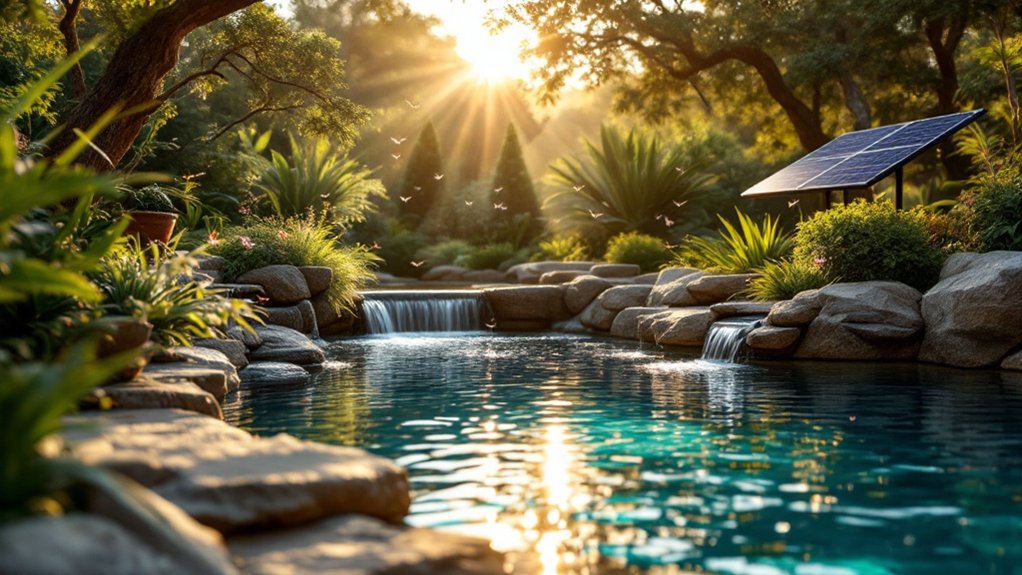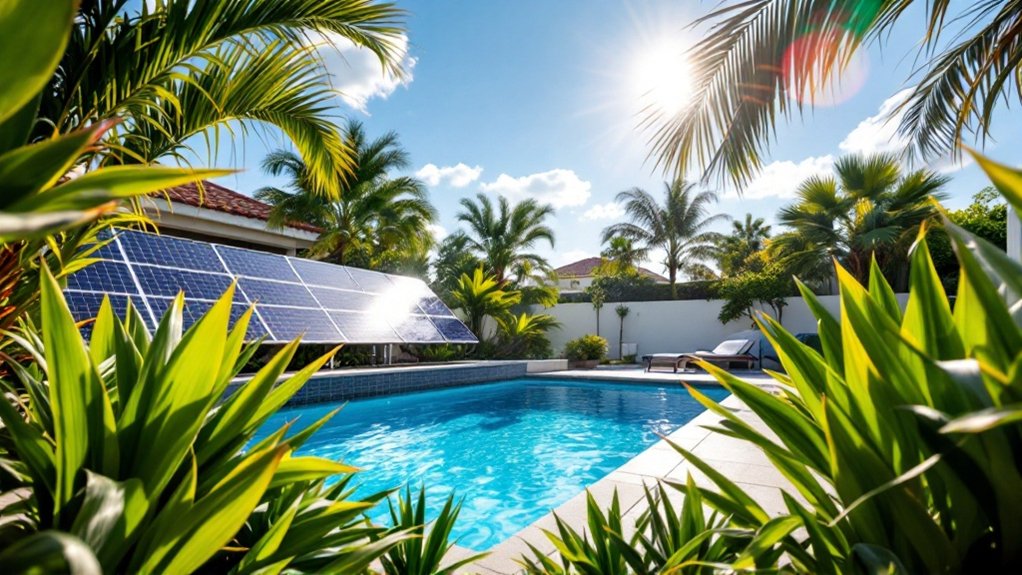Transforming a pool with sustainable construction choices is becoming increasingly relevant. Eco-friendly materials and energy-efficient systems can greatly enhance both aesthetics and functionality. From recycled tiles to solar heating, these options offer numerous benefits. Additionally, sustainable landscaping and innovative filtration systems can further optimize the pool’s environmental impact. As more homeowners seek to balance beauty with responsibility, the question arises: what specific choices can truly make a difference?
Choosing Eco-Friendly Pool Materials
When selecting materials for pool construction, homeowners should prioritize eco-friendly options to minimize environmental impact. Sustainable materials, such as recycled glass tiles, not only enhance aesthetic appeal but also reduce waste. Concrete alternatives, like permeable pavers, allow for better water drainage and lessen runoff, promoting healthier landscapes. Natural stone, sourced responsibly, offers durability and timeless beauty while reducing the carbon footprint associated with manufacturing. Additionally, opting for non-toxic sealants and finishes guarantees that harmful chemicals do not leach into surrounding ecosystems. By choosing renewable resources and sustainable practices, homeowners contribute to a more environmentally friendly pool that aligns with green living principles. Ultimately, these choices create a serene oasis that harmonizes with nature rather than detracting from it.
Energy-Efficient Pool Heating Options
Energy-efficient pool heating options play a vital role in reducing energy consumption and costs. Solar pool heating systems harness renewable energy, while heat pumps offer an efficient alternative by transferring heat rather than generating it. Exploring these technologies can lead to significant savings and a smaller environmental footprint. Additionally, gas pool heaters can provide efficient and reliable warmth, ensuring that your pool remains inviting throughout the year.
Solar Pool Heating Systems
How can pool owners maximize their enjoyment while minimizing environmental impact? Implementing solar pool heating systems offers an effective solution. These systems utilize solar panels to capture sunlight, converting it into heat that warms pool water. By harnessing renewable energy, pool owners can greatly reduce their reliance on fossil fuels, leading to lower greenhouse gas emissions. Additionally, solar heating systems can extend the swimming season, allowing for comfortable water temperatures without increasing energy costs. Installation costs are often offset by savings on utility bills over time, making them a financially wise choice. Moreover, many regions offer incentives for adopting solar technology, enhancing their affordability. Essentially, solar pool heating systems represent a sustainable and efficient method to enjoy pools year-round.
Heat Pump Efficiency
A significant number of pool owners are turning to heat pumps as an efficient alternative for heating their pools. Heat pumps operate by extracting heat from the air and transferring it to the pool water, making them highly energy-efficient compared to traditional gas heaters. These systems can provide up to five times more energy than they consume, resulting in lower operational costs and reduced environmental impact. Additionally, modern heat pumps are designed to work effectively in various climates, ensuring consistent heating throughout the swimming season. While the initial investment may be higher, the long-term savings and sustainability benefits make heat pumps a compelling choice for environmentally conscious pool owners. Their ability to minimize energy usage aligns well with sustainable construction practices.
Sustainable Landscaping Around Your Pool
What elements can transform the area around a pool into a sustainable oasis? Incorporating native plants is a key choice, as they require less water and maintenance, promoting biodiversity. Permeable paving stones can enhance drainage, reducing runoff and allowing rainwater to nourish surrounding vegetation. Installing raised beds with edible plants offers both aesthetic and functional benefits, creating a beautiful landscape while providing fresh produce. Utilizing organic mulch helps retain soil moisture and suppress weeds, minimizing the need for chemical treatments. Additionally, strategically placed shade trees can cool the area naturally, enhancing comfort and reducing energy consumption. Together, these sustainable landscaping practices not only enhance the visual appeal of the pool area but also contribute to environmental health and resilience.
Water Conservation Techniques for Pools
Sustainable landscaping practices around a pool not only enhance beauty but also set the stage for effective water conservation techniques. Implementing features such as pool covers can greatly reduce evaporation, retaining water and maintaining temperature. Opting for drought-resistant plants in surrounding gardens minimizes the need for additional irrigation, further conserving water resources. Rainwater harvesting systems can be integrated to collect and reuse rainwater for pool maintenance and landscaping needs, reducing dependence on municipal water supplies. Additionally, utilizing drip irrigation systems for surrounding gardens guarantees water is delivered efficiently, minimizing wastage. Regular maintenance, including checking for leaks and guaranteeing efficient circulation, also plays an essential role in reducing water loss. These techniques collectively contribute to a more sustainable and eco-friendly pool experience. Furthermore, regular pipe cleaning ensures optimal water circulation, enhancing both water conservation and overall pool health.
Innovative Pool Filtration Systems
Many homeowners are increasingly turning to innovative pool filtration systems that prioritize efficiency and sustainability. These systems utilize advanced technologies such as multi-stage filtration, which combines various methods like sand, cartridge, and diatomaceous earth filtration to enhance water clarity while reducing chemical usage. Additionally, eco-friendly options such as ozone and ultraviolet (UV) purification systems are gaining popularity, as they minimize the reliance on chlorine and other harsh chemicals. Moreover, variable-speed pumps are being integrated, allowing for significant energy savings by adjusting flow rates based on filtration needs. By investing in these modern filtration solutions, homeowners not only create cleaner and healthier swimming environments but also contribute to environmental preservation, making their pools more sustainable in the long run. Regular water quality maintenance ensures that these systems function optimally, maintaining safe water for swimming.
Incorporating Renewable Energy Solutions
As homeowners embrace innovative pool filtration systems, the integration of renewable energy solutions becomes a logical next step in enhancing pool sustainability. Utilizing solar panels to power pool pumps and heating systems considerably reduces energy consumption and lowers utility bills. Additionally, geothermal heating can provide an efficient method for maintaining comfortable water temperatures year-round. Wind turbines, where feasible, can also contribute to energy needs, making pools less reliant on traditional power sources. By combining these renewable energy technologies, pool owners not only minimize their carbon footprint but also promote environmental stewardship. Investing in these solutions enhances the longevity and efficiency of pool systems while aligning with sustainable living practices, ultimately transforming pools into eco-friendly sanctuaries.
Frequently Asked Questions
How Can I Make My Pool Area More Accessible for Everyone?
To enhance accessibility in a pool area, one could consider adding ramps, non-slip surfaces, handrails, and wide pathways. Additionally, incorporating accessible seating and shade options can create a welcoming environment for all visitors.
What Are the Maintenance Costs for Sustainable Pool Options?
The maintenance costs for sustainable pool options typically vary based on materials and technology used. Generally, energy-efficient systems and eco-friendly chemicals may require higher initial investments but can lead to significant long-term savings and reduced environmental impact.
Can I Retrofit an Existing Pool for Sustainability?
Retrofitting an existing pool for sustainability is feasible. Various options, such as energy-efficient pumps, solar heating, and eco-friendly cleaning systems, can enhance sustainability while reducing environmental impact and long-term maintenance costs. Careful planning is essential.
Are There Eco-Friendly Pool Covers Available?
Eco-friendly pool covers are available on the market, designed from sustainable materials that enhance energy efficiency and minimize evaporation. These covers contribute to reduced chemical use and lower heating costs, benefiting both the environment and pool maintenance.
How Do I Choose a Sustainable Pool Builder?
Choosing a sustainable pool builder requires researching their materials, energy-efficient practices, and certifications. One should seek recommendations, review past projects, and inquire about their commitment to environmentally friendly techniques and technologies in pool construction.
Conclusion
Incorporating sustainable construction choices for pools not only enhances their beauty but also fosters environmental stewardship. By selecting eco-friendly materials, energy-efficient heating options, and innovative filtration systems, pool owners can greatly reduce their carbon footprint. Additionally, implementing sustainable landscaping and water conservation techniques further contributes to a greener swimming experience. Ultimately, these conscious decisions create a harmonious balance between aesthetics and environmental responsibility, allowing for a more enjoyable and sustainable poolside retreat.




